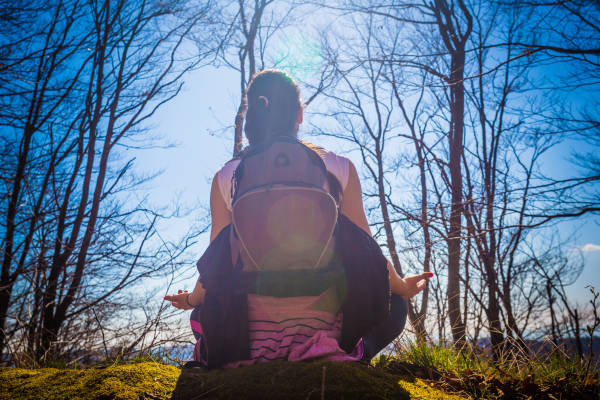What's the impact of nature and outdoor activities on well-being?
Discover the positive impact of nature and outdoor activities on your physical and mental well-being Explore the advantages of spending time in natural settings and engaging in outdoor pursuits for a healthier and happier life
What's the impact of nature and outdoor activities on well-being? Nature's profound influence on our physical, mental, and emotional well-being cannot be overstated. The healing power of natural environments and the benefits of outdoor activities have been well-documented in numerous studies. In this article, we will explore the positive effects of spending time in nature and engaging in outdoor activities, focusing on how they contribute to our overall well-being.

The Benefits of Nature and Outdoor Activities on Well-being
Natural Stress Relief
Spending time in nature and engaging in outdoor activities, such as hiking or camping, can provide natural stress relief. The serene environment and fresh air help reduce stress levels and promote relaxation.
Physical Health Improvement
Nature and outdoor activities contribute to physical well-being. Activities like jogging, biking, or simply taking a walk in a park enhance cardiovascular health, boost metabolism, and help in maintaining a healthy weight.
Mental Clarity and Cognitive Benefits
Nature has a positive impact on mental clarity and cognitive function. Being in natural surroundings can improve concentration, creativity, and problem-solving abilities. It also helps in reducing mental fatigue.
Emotional Well-being Enhancement
Connecting with nature fosters emotional well-being. It can elevate mood, reduce symptoms of anxiety and depression, and provide a sense of inner peace. Nature has a therapeutic effect on emotional health.
Immune System Support
Regular exposure to nature can boost the immune system. The increased production of natural killer cells and improved immune function contribute to better overall health and resilience against illnesses.
Enhanced Social Interaction
Nature and outdoor activities encourage social interaction. Engaging in group activities like team sports or picnics in natural settings promotes social connections, reducing feelings of isolation.
A Sense of Adventure and Exploration
Exploring the outdoors offers a sense of adventure and exploration. This sense of discovery can be invigorating, fostering a positive outlook on life and personal growth.
Promotion of Environmental Sustainability
Appreciating nature can lead to a greater concern for environmental sustainability. Individuals who spend time in the outdoors often develop a stronger commitment to protecting the environment.
Improved Sleep Patterns
Nature and outdoor activities contribute to improved sleep patterns. Exposure to natural light and physical activity can regulate sleep cycles, helping individuals achieve better and more restful sleep.
Why Is Spending Time in Nature Important for Well-being?
Stress Reduction and Mental Relaxation
Nature provides an escape from the stresses of daily life. The serene environment, green landscapes, and calming sounds of nature help in reducing stress levels and promoting mental relaxation.
Reconnection with the Natural World
Spending time in nature allows us to reconnect with the natural world. It reminds us of our place in the ecosystem and the importance of preserving the environment for future generations.
Physical Activity and Exercise
Many outdoor activities involve physical movement, such as hiking, biking, or gardening. Engaging in these activities provides exercise and helps in maintaining a healthy body, which is crucial for overall well-being.
Sunlight and Vitamin D
Being outdoors exposes us to sunlight, which is a natural source of vitamin D. Vitamin D is essential for bone health, immune function, and mood regulation. It plays a key role in overall well-being.
Connection with the Senses
Nature engages all our senses. The sights, sounds, smells, and textures of the natural world stimulate our senses, promoting mindfulness and enhancing our emotional and psychological well-being.
Reduction of Mental Fatigue
Time in nature can reduce mental fatigue. It provides a break from the constant mental demands of modern life and allows the brain to rest and recharge, leading to improved cognitive function.
Strengthening Emotional Resilience
Spending time in nature can help build emotional resilience. It provides an opportunity to face challenges, adapt to new environments, and cope with adversity, which are essential skills for overall well-being.
Improved Sleep Quality
Nature exposure can improve sleep quality. The natural light-dark cycle and the physical activity associated with outdoor activities can regulate sleep patterns, leading to better and more restful sleep.
Enhanced Creativity and Problem-Solving
Being in natural settings often boosts creativity and problem-solving abilities. The open and inspiring environment can lead to new ideas and insights, contributing to overall well-being.
Community and Social Connection
Nature provides a backdrop for social interaction. Outdoor group activities and community events in natural settings foster social connections and reduce feelings of isolation, which are vital for well-being.
Physical Health Benefits of Outdoor Activities
Cardiovascular Health Improvement
Engaging in outdoor activities, such as hiking, biking, or running, contributes to cardiovascular health. These activities increase heart rate, improve blood circulation, and strengthen the heart, reducing the risk of heart diseases.
Enhanced Respiratory Function
Outdoor activities involve exposure to fresh air, which can enhance respiratory function. Breathing in clean, oxygen-rich air helps to clear the lungs and promote better respiratory health.
Weight Management and Fitness
Outdoor activities provide an opportunity for physical exercise, aiding in weight management and fitness. Regular outdoor workouts help burn calories, build muscle, and maintain a healthy weight.
Bone Health and Vitamin D
Spending time outdoors exposes the body to natural sunlight, a key source of vitamin D. Vitamin D is crucial for calcium absorption, which supports bone health and reduces the risk of conditions like osteoporosis.
Increased Endurance and Stamina
Participating in outdoor activities can increase endurance and stamina. Activities like trail running or long hikes challenge the body, leading to improved physical performance and overall fitness.
Better Immune System Function
Outdoor activities contribute to a stronger immune system. Regular exposure to natural elements and physical activity stimulates the immune system, making it more effective in fighting off infections and illnesses.
Pain Reduction and Healing
Being in natural settings can help in pain reduction and healing. Nature's calming influence and reduced stress levels have been associated with pain relief and a faster recovery process.
Metabolism Boost
Outdoor activities can boost metabolism. Physical activity in natural settings enhances metabolic rate, helping with digestion and nutrient absorption, and aiding in weight management.
Enhanced Flexibility and Balance
Engaging in outdoor activities often requires balance and coordination, which can improve flexibility and balance. These skills are essential for overall physical well-being and injury prevention.
Reduction in Chronic Health Conditions
Regular participation in outdoor activities has been linked to a reduction in chronic health conditions. It can help manage conditions such as hypertension, diabetes, and obesity, leading to better overall health.
Mental Health and Emotional Well-being
Stress Reduction and Relaxation
Spending time in nature can reduce stress and promote relaxation. The tranquility of natural settings, soothing sounds, and the absence of daily stressors can have a calming effect on the mind.
Reduction of Anxiety and Depression Symptoms
Nature has been shown to reduce symptoms of anxiety and depression. Exposure to green spaces can lead to improved mood, reduced feelings of hopelessness, and a decrease in the severity of depressive symptoms.
Enhanced Emotional Resilience
Regular interaction with nature can enhance emotional resilience. It helps individuals cope with life's challenges, adapt to adversity, and develop a positive outlook, ultimately leading to improved emotional well-being.
Promotion of Mindfulness and Presence
Nature encourages mindfulness and presence. The sights, sounds, and sensations of the natural world captivate the mind, fostering a sense of being fully present in the moment, which can reduce rumination and stress.
Improved Self-esteem and Confidence
Spending time outdoors and achieving goals in natural settings can boost self-esteem and confidence. Accomplishing physical activities like hiking or rock climbing can instill a sense of achievement and self-worth.
Positive Effects on Cognitive Function
Nature has positive effects on cognitive function. Time spent in natural environments can improve attention, creativity, problem-solving, and memory, enhancing overall mental well-being.
Emotional Healing and Catharsis
Nature provides a space for emotional healing and catharsis. Being in natural surroundings can be therapeutic, allowing individuals to release emotions and find solace, contributing to emotional well-being.
Social Connection and Support
Outdoor activities often involve social interactions, which can provide emotional support. Connecting with others in a natural setting can reduce feelings of isolation and loneliness, supporting emotional well-being.
Promotion of Positive Relationships
Engaging in outdoor activities with loved ones can strengthen positive relationships. Nature provides a backdrop for meaningful connections, promoting emotional well-being for individuals and their social networks.
Emotional Release and Stress Management
Nature can offer a healthy outlet for emotional release and stress management. Activities like hiking or simply enjoying the outdoors provide a constructive way to manage and release stress and tension.
Social Interaction and Connection
Promoting Positive Relationships
Engaging in outdoor activities often fosters positive relationships. Spending time with friends and family in natural settings provides opportunities for bonding, shared experiences, and strengthening social connections.
Community Building
Outdoor events and group activities in natural settings contribute to community building. People with shared interests gather in outdoor spaces, fostering a sense of belonging and community among participants.
Reducing Isolation and Loneliness
Nature and outdoor activities can help reduce feelings of isolation and loneliness. Interacting with others in a natural environment provides a supportive social network and combats the negative effects of social isolation.
Supportive Social Environments
Natural settings often create supportive social environments. The absence of the usual distractions of modern life encourages meaningful conversations, empathy, and active listening, which can deepen social connections.
Team Building and Collaboration
Many outdoor activities require teamwork and collaboration. Activities like team sports or group hikes encourage individuals to work together, fostering a sense of unity and cooperation.
Enhancing Communication Skills
Participating in outdoor activities can enhance communication skills. In group settings, individuals practice effective communication, which can translate to improved social interactions in daily life.
Cultural and Interpersonal Understanding
Nature and outdoor activities can promote cultural and interpersonal understanding. Interacting with people from different backgrounds in natural settings can lead to broader perspectives and reduced prejudice.
Strengthening Family Bonds
Spending time in nature with family strengthens family bonds. Outdoor activities create lasting memories and encourage open communication, deepening the emotional connections within the family unit.
Networking Opportunities
Outdoor activities and nature-based events provide networking opportunities. Individuals can connect with like-minded people, fostering both personal and professional relationships and expanding social circles.
Emotional and Psychological Support
Nature-based social interactions can offer emotional and psychological support. Sharing experiences in natural settings can provide a safe space for discussing challenges, seeking advice, and offering support to one another.
The Role of Environmental Sustainability
Preserving Natural Ecosystems
Engaging in outdoor activities fosters a sense of responsibility for preserving natural ecosystems. Participants often become advocates for the protection of the environment and wildlife habitats.
Conservation and Biodiversity
Nature enthusiasts often actively engage in conservation efforts. They support initiatives to protect endangered species, conserve biodiversity, and maintain a healthy balance in ecosystems.
Education and Awareness
Nature-based activities promote education and environmental awareness. Participants learn about local ecosystems, climate change, and the importance of sustainable practices in preserving the planet.
Sustainable Outdoor Practices
Engaging in outdoor activities encourages sustainable practices. Participants are more likely to follow "Leave No Trace" principles, minimizing their environmental impact by respecting nature and reducing waste.
Advocacy for Green Initiatives
Nature enthusiasts often become advocates for green initiatives. They support policies and practices that prioritize environmental sustainability and work towards reducing the carbon footprint.
Responsible Outdoor Recreation
Nature-based activities promote responsible outdoor recreation. Enthusiasts prioritize eco-friendly gear and activities, ensuring that their love for the outdoors doesn't harm natural spaces.
Promoting Eco-Tourism
Engaging in outdoor activities supports eco-tourism. People seek out and contribute to destinations that prioritize sustainable tourism practices, which benefit local economies while preserving nature.
Influencing Lifestyle Choices
Experiences in nature can influence lifestyle choices. Participants often adopt eco-friendly habits, such as reducing waste, conserving water, and supporting sustainable products and practices.
Community Environmental Initiatives
Engaging with nature can lead to community environmental initiatives. Enthusiasts often participate in local conservation projects, tree planting, and efforts to improve the natural environment in their communities.
Long-term Commitment to Sustainability
Outdoor enthusiasts often make long-term commitments to sustainability. Their love for the environment can drive ongoing efforts to reduce their ecological footprint and advocate for sustainable living.
FAQs about Nature, Outdoor Activities, and Well-being
Q1: How do outdoor activities benefit physical health?
A1: Outdoor activities benefit physical health by promoting cardiovascular health, enhancing respiratory function, supporting weight management, and increasing endurance. Engaging in activities like hiking, running, and biking in natural settings can lead to better overall physical well-being.
Q2: Can spending time in nature improve mental health?
A2: Yes, spending time in nature can improve mental health. It has been shown to reduce stress, alleviate symptoms of anxiety and depression, enhance emotional resilience, and promote mindfulness. Nature provides a therapeutic environment for emotional and psychological well-being.
Q3: How do outdoor activities contribute to social interaction and connection?
A3: Outdoor activities contribute to social interaction and connection by promoting positive relationships, community building, and reducing feelings of isolation. Engaging in group activities in natural settings fosters a sense of belonging, support, and camaraderie among participants.
Q4: What role does environmental sustainability play in outdoor activities?
A4: Environmental sustainability is vital in outdoor activities as it encourages responsible practices. Participants often become advocates for environmental conservation, supporting initiatives to preserve natural ecosystems, promote eco-tourism, and reduce their ecological footprint during outdoor adventures.
Q5: How can nature enthusiasts support and contribute to sustainability?
A5: Nature enthusiasts can support sustainability by adopting eco-friendly habits in their daily lives, such as reducing waste, conserving water, and supporting sustainable products and practices. They can also engage in community environmental initiatives and participate in conservation projects to actively contribute to a more sustainable future.










